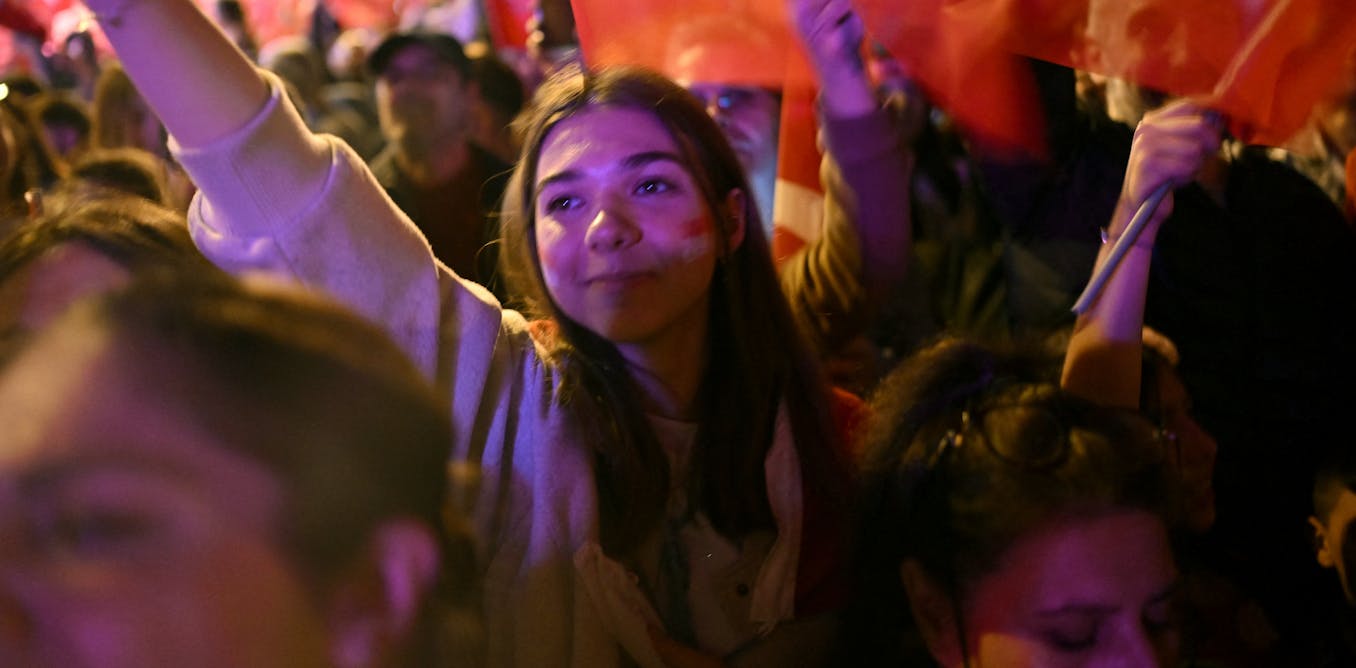The dilemma before the 31 March municipal elections was between status quo and change. With Sunday’s hindsight, one can affirm the event has marked an unprecedented shift in recent Turkish politics. This is not just because the results have led to administrative switches in 29 provinces nationwide but also because this marks a substantial alteration in local power dynamics.
For the first time in over two decades, the main opposition party, the Republican People’s Party (CHP), surpassed Erdoğan’s conservative Justice and Development Party (AKP) on a national scale, capturing 37.77% of the vote. What made its victory historic is the extension of its influence beyond its traditional urban strongholds until areas long considered bastions of the ruling AKP.
Erdoğan’s party clings to strongholds
Despite losing several provinces in the region, Erdoğan’s party remained strong in its historical strongholds in central Anatolia and still achieved greater success in southeast regions affected by the double earthquake in February 2023, notably in the southeastern of Kahramanmaras and Gaziantep.
However, its loss of votes is not only linked to the CHP’s strategy but also to the achievements of those political forces that supported Erdoğan in last year’s presidential elections. Indeed, the 31 March results highlight a significant shift within the right-conservative area too. The success of the more extremist factions, represented by the Islamist Yeniden Refah Partisi (YRP) and the Nationalist Movement Party (MHP), shows discontent on both sides of Erdoğan’s electorate. In this election, those who believe the AKP has adopted too lenient a stance on religion and nationalism have moved toward the YRP and MHP.
Conversely, those who chose not to renew their support for the AKP due to economic reasons have shifted toward the Republican People’s Party (CHP). Exploiting these drifts within the right-conservative camp, for the first time, the CHP made a breakthrough in municipalities like Bursa (Northwest), Afyon (West), and Adiyaman (Southwast). If this might be mainly due to bad economic performance and wrong choice of the candidates, this expansion signaled a broadening support base for the opposition, even in conservative regions.
This dynamic also played out within neighbourhoods of Istanbul. The CHP, in addition to reappointing Imamoğlu, also managed to secure victories in traditionally conservative neighborhoods such as Üskudar (Asian Side) and Beyoğlu (European Side).
An outcome impacted by different factors
Moreover, these elections once again highlighted the importance of the Kurdish vote, which has traditionally acted as the swing vote in determining election outcomes. The pro-Kurdish and left-wing party, DEM, increased its support in the southeast of the country, along the border with Syria and Iraq, by both its vote share and the number of provinces won compared to five years ago.
Several factors significantly influenced the outcome of the elections. The economic situation took centre stage, with the opposition effectively highlighting the distinction between national economic issues and local governance achievements. At the same time, intra-party dynamics also played a role.
Turkey’s main opposition party, the CHP, responded to its supporters’ wishes for change after numerous electoral losses under the leadership of Kemal Kilicdaroğlu. By appointing Özgür Özel as the new secretary and elevating the profiles of charismatic mayors like Imamoğlu and Yavaş, who oppose Turkey’s shift toward autocracy, the party has made significant strides in appealing to voters.
Turkey, known for its high electoral turnout, saw a slight decrease in voter participation, with rates falling from 84% in 2019 to 78% now, reaching the lowest level since 2004. This decline predominantly reflected the dissatisfaction among Erdoğan’s party supporters, many of whom expressed discontent with the country’s economic trajectory. Promises of overarching improvements went unfulfilled, fueling voter disillusionment, especially from the more vulnerable population segments, such as retired and unemployed people.
A distinction between Erdoğan and his party
With Erdoğan not being a direct candidate, AKP’s supporters seemed to have made a distinction between the leader and the party. Despite his indirect candidacy, the highly personalised campaign led by Erdoğan failed to energise his base, highlighting a desire for political renewal and change. This might be a consequence of the implementation of the presidential system, which, starting in 2018, has increasingly concentrated power in the hands of the President, gradually losing contact and the ability to disseminate administrative influence at the local level.
This was strongly evident in the predominantly Kurdish southeast region of Turkey, where the electoral campaign was centred against the practice of appointing government officials in place of mayors who had been officially elected in the previous municipal elections.
In a competitive authoritarian system where the power in the President’s hands is almost unchecked, the local elections in Turkey epitomise the traditional concept of “checks and balances” of presidential systems, which find less room at the governmental level. Erdoğan has always claimed to have built his leadership and legitimacy through the ballot box, yet he encountered an unexpected response this time.
The Turkish voters, known for their strong civil society activism, have become a key force against the country’s drift toward authoritarian rule. By taking action, they have helped create a more balanced political environment, reducing the dominance of any single extreme.
A strong democratic resilience
It is not by chance that Ekrem Imamoğlu, the reelected mayor of Istanbul, began his speech by saying, “As we celebrate our victory, we send a message to the world: the decline of democracy is over.” This highlights that, despite the lower turnout, Turkey showcased a strong democratic resilience, confirming the importance of the vote for its citizens and the need for its leaders to get real popular consensus.
The CHP’s historic victory signals a shift in the political dynamics, with economic dissatisfaction, leadership renewal, and governance concerns driving a broad swath of the electorate toward the opposition. While these elections have represented an unprecedented result for the opposition in Turkey, the post-election period will undoubtedly not be straightforward.
Erdoğan and his party will remain in office in Turkey until 2028. That is why, until that date, the opposition needs to focus on two main points. First, advancing a depolarising narrative aimed at bridging the traditional secularist-conservative divide that has characterised the Turkish electorate for years. Second, preparing a long-term plan to address voters most pressing issues such as economy and unenployment that could gain transversal support beyond traditional identity and religious cleavages.
As Turkey moves forward, the outcome of the election signals a pivotal change and an increasing desire for transformation among its citizens that could redefine the nation’s political trajectory. The question remains whether the opposition, caught between limited political manoeuvrability and heightened responsibilities, can effectively steward the confidence bestowed by the voters.



